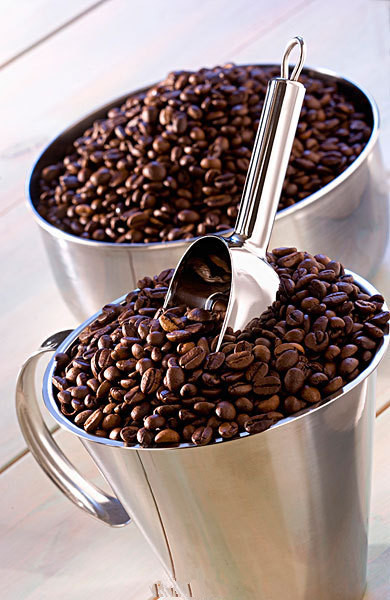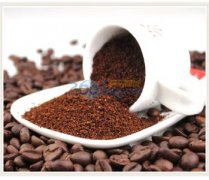The characteristics and utility of coffee

1. Bitterness: Caffeine, one of the basic taste elements of coffee.
2. Acidity: Tannin, the second essential taste element of coffee.
3. Espresso: Strong coffee. A mellow smell.
4. Sweet: Sugar in coffee beans, roasted, partly charred, partly sweet.
5. Aroma (coffee aroma): The fat in green coffee beans. protein. Sugar is an important source of coffee aroma.
Some people ask, what is the charm of coffee?
Personally feel: it is the appropriate acid bitter, fragrant alcohol, coffee and thus the formation of a unique charm. Alcohol or tobacco can be intoxicating and stimulating, and caffeine can also be exciting. And caffeine has the effect of stimulating the central nervous system or muscles, can make muscles recover fatigue, has a sober effect, can make the mind responsive, improve work efficiency. Also can stimulate sympathetic nerve, suppress the excitement of parasympathetic nerve and cause asthma. And coffee also has the effect of helping digestion, especially when eating meat, gastric juice secretion, promote digestion, prevent gastroptosis. Because caffeine breaks down fat, Westerners must want a cup of coffee after eating high-calorie foods.
Coffee's Benefits:
Coffee contains a lot of caffeine can you affect health? Perhaps some people would worry so much. However, two to three cups of coffee is no problem, but moderate drinking coffee has a therapeutic effect on the body. Caffeine intake and osteoporosis: Osteoporosis is not a women-specific disease, but occurs mostly in women. Factors contributing to osteoporosis include calcium and protein intake, smoking, exercise habits, age and weight. To shed more light on the relationship between caffeine intake and osteoporosis, a 1994 Barrett Connor study found that caffeine intake affected bone density-but only in women who drank very little milk daily. According to the study, and as a rule of thumb, coffee only indirectly causes calcium imbalance-for example, some women substitute it for calcium-rich beverages. In 1995 Barger-Lux and Heaney analyzed data from 190 women and concluded that "one cup of milk provides enough calcium to offset the negative effects of eight cups of caffeine." "This highlights the fact that caffeine is not a high risk factor for osteoporosis, and that insufficient calcium intake is the primary cause, allowing secondary factors such as caffeine's effects on bone to take effect.
A 1981 Harvard University report suggested that drinking too much coffee could lead to pancreatic cancer. However, at least seven major studies have since failed to confirm this, so the researchers retracted this conclusion. Several other studies have failed to link coffee drinking to pancreatic cancer. Heavy coffee drinking appears to reduce the risk of colon cancer, with people who drink at least five cups of coffee a day 40 percent less likely to develop colon cancer than non-coffee drinkers, according to a Boston University study.
Coffee has the effect of eliminating garlic flavor, but also contains enamel, so after tasting garlic dishes, coffee is an indispensable drink. A 1980s study found that men who drank five or more cups of coffee a day for long periods of time were more likely to suffer from heart disease. But recent studies have found that women who drink less than five cups of coffee a day do not have an increased risk of heart attack, and women who drink more than six cups a day do not appear to have an increased risk of heart attack. Coffee also has a deodorizing effect. The residue of ground coffee brewing is dried in a container, placed in the refrigerator, or in a shoe box as a deodorizing agent. Sprinkle it in an ashtray to eliminate tobacco smell. Coffee can also be used to hide flavor. For example, instant coffee is dissolved in boiling water, so that its taste can be more sweet and delicious meat dishes.
Fragrant coffee is a refreshing drink, and the latest research also found that drinking a few cups of coffee a day can also prevent gallstones. Harvard University researchers found that men who drank two to three cups of coffee a day had a 40 percent lower risk of developing gallstones than non-coffee drinkers, while men who drank four or more cups of coffee a day had a 45 percent lower risk of developing gallstones, the Journal of the American Medical Association reported. However, caffeine-free coffee can not have this effect, only caffeinated coffee, in order to stimulate gallbladder contraction, and reduce cholesterol in bile easy to form gallstones. As for the reason for the effect of coffee, it is still unclear, and other beverages such as tea and cola, which also contain caffeine, cannot achieve the same effect because the caffeine content is lower than coffee. Dr. Leitzman, who led the study, said: "I wouldn't really recommend drinking coffee to prevent gallstones, but it's okay to keep drinking coffee because coffee doesn't cause any major diseases." He said the findings should also apply to women. Cholelithiasis is mainly formed by cholesterol, lack of exercise, greasy diet or excessive weight are the main causes. Knowing coffee correctly will make everyone happy and enjoy coffee time!
Important Notice :
前街咖啡 FrontStreet Coffee has moved to new addredd:
FrontStreet Coffee Address: 315,Donghua East Road,GuangZhou
Tel:020 38364473
- Prev

Coffee science
There are a variety of small rules for roasting and extracting raw coffee beans. The big law formed by the combination of these small rules is systematic caffeine.
- Next

The definition of boutique coffee
According to the newly revised definition of the American Fine Coffee Association: boutique coffee is carefully selected as the most suitable variety, planted in the altitude, climate, soil and water environment that is most conducive to the development of coffee flavor; careful washing and sun processing, selection of the most advanced raw beans without defects, zero defects in the process of transportation, delivered to customers; after the excellent craftsmanship of the roaster, it leads to the richest regional flavor, and then with the recognized extract.
Related
- Beginners will see the "Coffee pull flower" guide!
- What is the difference between ice blog purified milk and ordinary milk coffee?
- Why is the Philippines the largest producer of crops in Liberia?
- For coffee extraction, should the fine powder be retained?
- How does extracted espresso fill pressed powder? How much strength does it take to press the powder?
- How to make jasmine cold extract coffee? Is the jasmine + latte good?
- Will this little toy really make the coffee taste better? How does Lily Drip affect coffee extraction?
- Will the action of slapping the filter cup also affect coffee extraction?
- What's the difference between powder-to-water ratio and powder-to-liquid ratio?
- What is the Ethiopian local species? What does it have to do with Heirloom native species?

